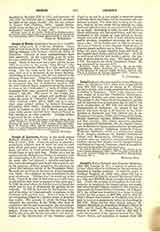

Joseph of Exeter (JOSEPHUS ISCANUS), a twelfth-century Latin poet; b. at Exeter, England. About 1180 he went to study at Gueldres, where he began his lifelong intimacy with Guibert, afterwards Abbot of Florennes. Portions of their correspondence have been preserved. In the succeeding years he wrote his most celebrated poem “De bello Trojano” in six books. Much of this must have been written before 1183, as he refers to the young “King Henry” (who predeceased his father Henry II in that year) as still living. But the work must have been completed after 1184 as it is dedicated to his friend Baldwin, Archbishop of Canterbury, who did not succeed to the primacy till that year. When the archbishop set out on the crusade to the Holy Land he induced Joseph to accompany him, but on Baldwin‘s death in 1190 the poet returned home, commemorating the crusade in verse in his “Antiocheis”, a work of which only fragments have been, preserved (see Camden’s “Remaines”, 338-39). The poem on the Trojan war was printed in a very corrupt and mutilated form under the name of “Cornelius Nepos” (Basle, 1558; 1583; Antwerp, 1608; Milan, 1669), and in a somewhat more critical edition by Samuel Dresemius (Frankfort, 1620; 1623). English editions were published in London in 1675 (by J. More) and in 1825. Some other poems now lost have been attributed to him, though on no valid authority. Nothing further is known of his life or death.
EDWIN BURTON

